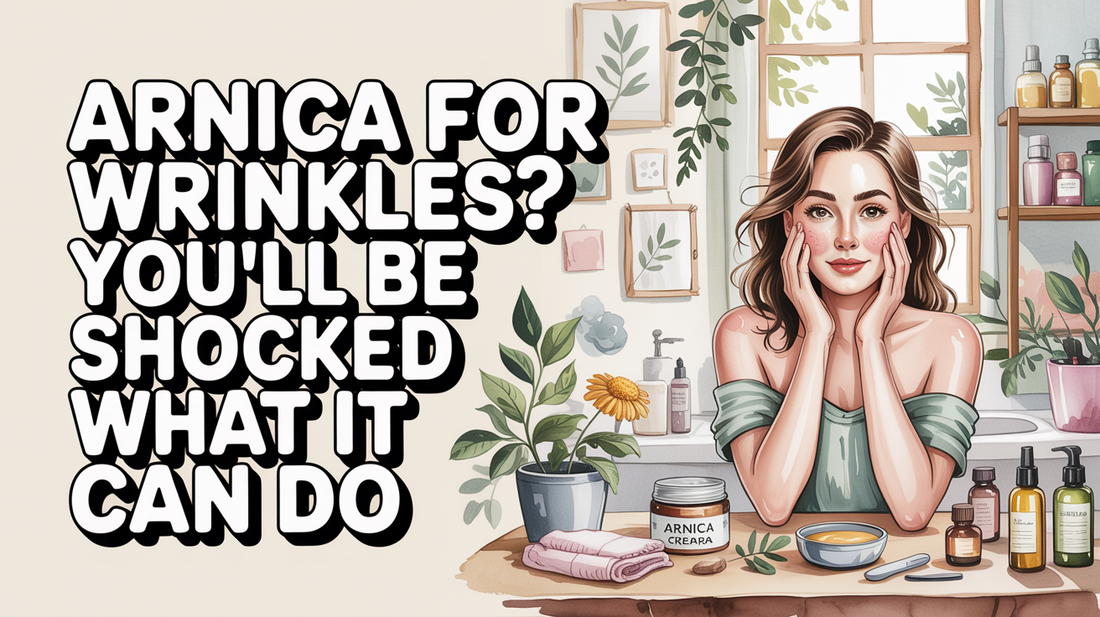Can arnica help wrinkles?
If you're concerned about the appearance of wrinkles and fine lines, you're not alone. Many seek effective solutions for anti-aging skin care. Arnica has garnered interest for its potential benefits in this area. This post is organized into three sections based on current research, helping you discover how you can incorporate arnica into your routine tonight.
Arnica for Wrinkles
Arnica montana, a flowering herb known for its traditional uses in homeopathic medicine, has gained traction in skincare for its potential properties related to aging. Although direct research on arnica for wrinkles is limited, some findings suggest it may improve the skin's appearance through its gentle, soothing effects on inflammation and circulation.
Compounds found in arnica, such as helenalin and flavonoids, may support reduced inflammation in skin cells. While some products containing arnica claim to stimulate collagen production, it's essential to note that clinical evidence is still emerging. Additionally, this herb may enhance blood circulation to the skin, which could help deliver essential nutrients more effectively.
- Arnica has compounds that may assist in reducing skin cell inflammation.
- It is often paired with other anti-aging ingredients like vitamin C.
- Some users report improved skin texture when using arnica-based products.
Try It Tonight: Eye & Skin Refresh ✨
- Remove makeup and cleanse gently with lukewarm water.
- Apply a cool compress or take a few deep breaths to relax facial tension.
- Lightly dab a pea-sized amount of Jane Vine Arnica Gel under eyes or on areas of concern. Always patch-test first if you’re new to arnica-based skincare.
Skin Health Benefits
Aside from its potential role in wrinkle reduction, arnica is celebrated for its various benefits for overall skin health. Its anti-inflammatory properties make it a gentle option for soothing damaged or irritated skin, which can be particularly helpful for sensitive skin types.
Arnica's traditional uses include reducing bruising and swelling, which may enhance skin recovery. Its antioxidant content could aid in protecting the skin from environmental stressors and free radical damage, promoting a healthier appearance.
- Arnica may help calm redness and irritation.
- It can potentially assist in wound healing, making it beneficial for aging skin.
- Generally well-tolerated, but do patch test for any sensitivities.
Why We Recommend a Gentle Helper 🌿
Jane Vine Arnica Gel is designed for quick absorption, leaving a soothing, lightweight feel on your skin. It may support a calm routine, helping to minimize the appearance of puffiness and dark circles over time.
- Fast-absorbing comfort—no greasy residue.
- Gentle, cooling sensation designed for delicate skin.
- Clean, naturally inspired formula with a fresh finish.
Best Uses in Routine 🔍
When adding arnica to your skincare routine for its potential anti-aging benefits, timing and application are crucial for safety and effectiveness. Typically, arnica is best used in diluted topical forms rather than pure extracts to maximize its gentle properties.
For optimal results, consider using arnica-containing products in your evening routine to avoid any sensitivity to sunlight. Starting with lower concentrations and performing a patch test is advisable, especially for those new to arnica.
- Apply arnica to clean skin before heavier moisturizers.
- Look for products combining arnica with proven anti-aging ingredients like peptides.
- Avoid using arnica on broken or severely irritated skin.

